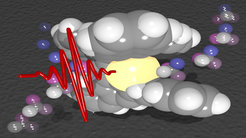ERC Starting Grant for project on asymmetric organo-catalysis
The European Research Council supports the project “Fundamentals of ASymmeTric Organo-CATalysis“ (FASTO-CAT) by Dr. Johannes Hunger with an ERC Starting Grant of 1.9 million euros. The project leader at the Max Planck Institute for Polymer Research (MPI-P) investigates the working principles of asymmetric organo-catalysis – a novel, environmentally benign catalytic route. To understand the fundamentals of these catalysts, he focuses on the catalyst-substrate interaction, which is the key intermediate for efficient stereocontrol. The goal of investigating these reactive intermediates with a combination of spectroscopic techniques is to help develop new catalytic routes and optimize existing catalyses.

In contrast to conventional asymmetric transition metal catalysis, asymmetric organo-catalysis represents a metal-free alternative. These catalysts provide high stereoselectivity and are therefore particularly suited for biologically relevant molecules, whose chirality is important for various functions, e.g. for the pharmaceutical activity of drugs. Despite the success of these organo-chemical routes, remarkably little is known about the reactive intermediates in a realistic environment. Since these intermediates, however, induce chirality in the first place, Hunger wants to experimentally quantify the formation of reaction intermediates and analyze their nature as well as geometry.
Hunger uses a combination of different spectroscopic methods: With ultrafast two-color and two-dimensional infrared spectroscopy he detects molecular vibrations, in order to trace changes in the molecules’ environment in real-time. By means of dielectric and NMR spectroscopy he investigates the electronic structure and binding motifs between the catalyst and the substrate. This combination of techniques allows probing molecular interactions on all timescales relevant to catalytic processes ranging from femtoseconds to seconds. Correlating such information with the enantiomeric excess obtained in catalytic processes allows identifying the key elements that are required for stereocontrol. Such molecular-level insights will provide fundamental parameters for the optimization of reaction conditions and routes towards novel catalytic routes.
The goal of optimizing catalysis as well as predicting new catalytic routes opens different fields of application for the asymmetric organo-catalysis. For example in medicine, it may lead toward a more efficient and targeted production of antimalarial medication.
About Johannes Hunger

Johannes Hunger works as a project leader at the MPI-P since 2012. He studied chemistry at the University of Regensburg, where he also obtained his PhD in 2010 focusing on the dynamics of electrolytes. He then worked as a postdoctoral researcher at the FOM Institute for Atomic and Molecular Physics in Amsterdam.













